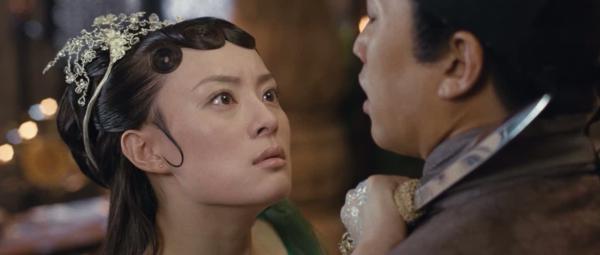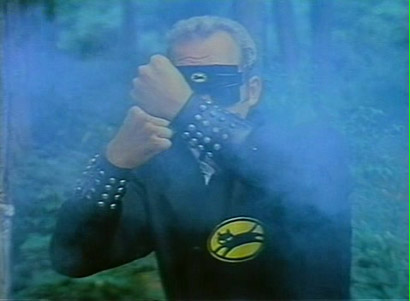Mural
aka 畫壁

2011![]()
Written by Gordon Chan Ka-Seung, Lau Ho-Leung, Frankie Tam Gong-Yuen, and Maria Wong Si-Man
Directed by Gordon Chan Ka-Seung and Danny Go Lam-Paau

Mural is another attempt from China to make bigger Hollywood-style pictures, which is both a good and a bad thing. It is good that money is being brought into make epic films. It is bad because the films being produced are all generic garbage. And as the money flows away from Hong Kong into the pack of upstart Mainland production companies, things are changing rapidly in both Hong Kong and Chinese cinema. But this review isn’t about that, it’s about Mural, a story about a guy who goes into a painting full of fairy women.

While Mural certainly looks nice, the story doesn’t hold up to the visuals and things become very bland. The visuals of creatures and monsters make good spectacles, even if the CGI isn’t up to par with Western films yet. Monsters and beauties are the two main attractions to Mural, there is enough of both you can let some things slide. Some good scenes and creativity in monster design help make certain points more memorable, but the underlying uninteresting characters and the obvious conclusion of the main love story cause things to not be so much a journey as just a trip through a museum.

Like Gordan Chan’s prior film Painted Skin, it is a tale from Pu Songling’s story collection Strange Stories from a Chinese Studio. The tomb contains nearly 500 tales, and has been the basis for dozens of films and tv series, including the Chinese Ghost Story films.
There are far too many of the models/actresses/singers playing the fariy women to list them all in the Roll Call, but I should name drop a few, like model-actress Monica Mok Xiao-Qi, Xia Yi-Yao, and Bao Wen-Jing. And now we will never mention them again! Even Eric Tsang Chi-Wai shows up with ear extensions as a goofy monk.


|


Mural starts with a scholar Zhu Xiaolian and his servant Hou Xia chasing after a thief, Meng Longtan. Their race bringing them into a temple run by a Monk named Budong (played by Eric Tsang.) There, the scholar notices one of the paintings on the wall that is packed with young women. Soon, one of the women in the painting blinks and disappears, reappearing in real life inside the temple. Zhu Xiaolian follows her, and is soon led into her world. Her name is Mudan, and she lives in a giant temple building filled with female fairies who serve their Queen. But men are not allowed in this world, Mudan trying desperately to convince Zhu Xiaolian to hide in a nearby village. But it is too late, time for the daily roll call of fairy women, where Zhu Xiaolian is hidden among them, his covered aided by various fairies like Mudan’s friend Cuizhu and the second in command fairy, Shaoyao, who no one likes as they see her as a pet of the Queen.
The Queen herself comes out, demanding praise from her fairy subjects. But she smells the smell of men in the air, and just when Zhu thinks he is cause, we find out there is another man there, a male Rock Monster who forms together from a bunch of black pebbles. The Rock Monster engages the Queen and her troops in battle, and it is here where a bronze owl transforms into Golden Warrior – who totally doesn’t look like He-Man, why would you ever make that comparison? – and joins the battle. The Rock Monster is defeated, but not without revealing he was there because of love of one of the fairy women, which starts the Queen on a long rant about how all men are jerks and sleep with everything animal, vegetable, or mineral. We also notice that fairy Yunmei is obviously the Rock Monster’s lover, but she’s prevented from revealing herself by Shaoyao.


Zhu ends up being hidden in Shaoyao’s quarters where he hears some of her insecurities as she talks to herself. She delivers him to Mudan, who wants to see the human world. But Zhu’s hesitation to take her because she declares love for him causes him to return without her, and when he sees the painting again, Mudan is missing and has appeared in a painting of Hell!

Zhu is a responsible man and determined to not have her punished for his deeds, so he sets out to go back into the painting again, this time taking his servant Hou Xia and the thief Meng with him. They are immediately captured by the Queens troops, but brought in as guests, the Queen obviously having some sort of ulterior motive. Shaoyao and the other girls refuse to answer questions about where Mudan is.


The Queen lets Meng choose a girl to marry, and he ends up picking Yunmei. But even during the wedding celebration ceremony he’s already eying other women. By the next day he has rejected her and picked a new woman to marry. Zhu also demands a marriage, picking Mudan’s best friend Cuizhu – but secretly only so he has an excuse to stay at the compound until he finds Mudan. Servant Hou Xia also picks a wife, Yunmei, who by this point is so miserable she is just staring into space in despair with tears rolling down.

Zhu and Cuizhu continue pretending with their marriage, with Cuizhu becoming more used to pretending to be a wife. It is obvious that Shaolao has feelings for Zhu, though nothing is said. Meng adds three more wives two his total, while Zhu paints a huge landscape artpiece of the Chinese capital for Mudan in a drunken haze.


We learn the Queen is taunting Mudan in her cell in a fiery place, though Golden Warrior and Shaolao know where she is at. Shaolao gives Mudan Zhu’s fan for comfort.
Zhu sets out to rescue Mudan, and the fairy women help capture Shaolao so she’ll lead them to where she is kept. The party of fairy women and three men head off and things get more fantastical, with a giant turtle and an even gianter turtle that gives rides, and a flying many-eyed guardian creature with arms and swords who fights the fairies and humans. Probably the most exciting action sequence is the fight here, and wee see each fairy woman’s different nature-based powers. Shaoyao is the only one capable of defeating the monster (with the help of the other women) and she helps rescue Mudan thanks to her magical crown, which means she has to take Mudan’s place. The other fairies declare that Shaolao will soon be rescued by the Queen as she’s her pet, and everyone goes back to the city.


Mudan is awed that Zhu came back for her, but it is obvious that he does not love her and instead likes Shaolao. Mudan tries to lie to the Queen to explain things, but ends up getting in more trouble. Zhu’s attempts to smooth things over end in the Queen going 100% psycho, and soon all the fairies are rebelling, led by a rescued Shaolao (and Golden Warrior sacrifices his live to save her.) Things don’t end quite like you think they might with said rebellion, but the film still has a ways to go, so the implied bad ending isn’t quite the ending.

But even as reset buttons are hit and things seem to play out, the final messages of duty and love don’t quite ring as true as the declarations of the characters speaking them intend. This is further complicated by the onion skin layers of endings upons endings seemingly destroying any messages the film spend two hours laying out. By the time it is over, you won’t be sure what is real or what is fantasy. Though I prefer to believe that the entire thing was nothing but a delusion of the mad monk Budong, who slaughters all visitors and then envisions a crazed fairy-filled world explaining their absense to ease his soul into enlightenment.


Zhu Xiaolian’s scholarly uptightedness contrasts with Meng’s hedonistic attitude, though the pair end up becoming friends through their shared adventure. Meng learns responsibility, while Zhu finds the love he declared earlier that he only deserved after becoming successful in life, which his own rules prevents him from accepting it. The servent Hou Xia grows from a lapdog companion of Zhu’s into a more complex character, attempting to right wrongs with what little skills he has available to him. Ultimately, Meng and Hou Xia end up with love and families they thought they didn’t need or deserve, while Zhu is unavailable to to claim his love due to his own sense of duty and inability to sacrifice.
If you are looking for strong female characters, despite the fact Mural is packed to the gils with actreses, none are to be found. Every fairy woman talks non-stop about wanting to be a wife, be loved by the three male characters, or to have their babies. Even the woman who likes being free ends up wanting a husband. Only duty to the country is more important to the characters. The lone strong female character is the Queen, and even she is revealed to have created the entire world as an escape from a failed romance from Budong. The Queen abandons the world she created the second the man in her life, the monk Budong, returns – though at least she has the courtesy to repair back all the damage she did to it after killing all the characters in the movie. Sorry, women, it’s your duty to be baby factories unless you are the governor, in that case you can’t even date.


While Mural doesn’t quite hold up to its lofty goals of looking awesome, it isn’t an ugly film. The effects work and flying wuxia battle sequences sound better in text form than when witnessed on the screen. While Mural tries to be bigger than its britches, the on screen evidence fools no one, and the story’s banality keeps Mural from breaking its bonds and becoming more than itself. By espousing the view of not taking risks and doing your duty, the film fails to take risks with the story, and there is no happy ending for the audience.


Rated 5/10 (Cultural Ministry, painting head, Rock Monster back, Bronze Owl, That’s no woman that’s a man baby!)
Please give feedback below!










5 Comments
Pingback:
March 1, 2012 at 6:55 amvy
June 26, 2012 at 2:44 pmi think you spelled the name Shaoyao wrong
Tars Tarkas
June 26, 2012 at 3:39 pmIt’s spelled the way the subtitles and credits spelled it
simon
September 7, 2012 at 9:31 amBetty Sun’s monologue at the end was painful to watch
Tars Tarkas
September 7, 2012 at 8:47 pmDon’t you just love films with giant lectures at the end where everyone has to accept being miserable?
I will say Betty Sun has not been used in films to the potential I think she has. Every film she’s been in they make her so dull and boring. But that seems the way mainstream Chinese film is headed at the moment.